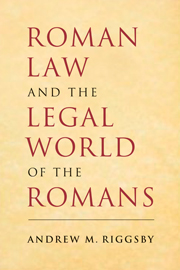Book contents
- Frontmatter
- Contents
- ROMAN LAW AND THE LEGAL WORLD OF THE ROMANS
- 1 Introduction
- 2 Roman History – The Brief Version
- 3 Sources of Roman Law
- 4 Sources for Roman Law
- 5 The Legal Professions
- 6 Legal Education
- 7 Social Control
- 8 Legal (In)equality
- 9 Writing and the Law
- 10 Status
- 11 Civil Procedure
- 12 Contracts
- 13 Ownership and Possession
- 14 Other Rights over Property
- 15 Inheritance
- 16 Women and Property
- 17 Family Law
- 18 Delict
- 19 Crimes and Punishments
- 20 Religious Law
- 21 Law in the Provinces
- 22 Conclusion
- Documents
- Glossary
- Further Reading
- Index
18 - Delict
Published online by Cambridge University Press: 05 June 2012
- Frontmatter
- Contents
- ROMAN LAW AND THE LEGAL WORLD OF THE ROMANS
- 1 Introduction
- 2 Roman History – The Brief Version
- 3 Sources of Roman Law
- 4 Sources for Roman Law
- 5 The Legal Professions
- 6 Legal Education
- 7 Social Control
- 8 Legal (In)equality
- 9 Writing and the Law
- 10 Status
- 11 Civil Procedure
- 12 Contracts
- 13 Ownership and Possession
- 14 Other Rights over Property
- 15 Inheritance
- 16 Women and Property
- 17 Family Law
- 18 Delict
- 19 Crimes and Punishments
- 20 Religious Law
- 21 Law in the Provinces
- 22 Conclusion
- Documents
- Glossary
- Further Reading
- Index
Summary
Roman and common law have similar ideas of a “wrongful act which does not involve a breach of contract and for which the injured party can recover damages in a civil action”; we call this a “tort,” and in Roman law the parallel category of acts is called “delict.” Delicts were tried according to private procedure, and the plaintiff, if successful, received money compensation for the damage but potentially also additional cash as a punishment of the wrongdoer. Thus delicts and torts are somewhere between crimes (very much the business of the state) and, say, contract disputes (primarily a matter between the parties alone). The main difference between tort and delict is that the Romans included under the heading of delict several offenses (theft, most assaults) that we routinely treat as crimes today. The following sections will treat three of the most important delicts, but I will begin by noting some features that are common to most or all of them. First, every delict required both an overt act and the intent to commit that act (even if not all the consequences were intended). Thus mere accident or bad intention alone could not give rise to a delict. These rules are shared with those for crimes (see the next chapter) as against, say, cases of contract law. Also (and again in common with the criminal law), not only the criminal himself was liable, but also persons who gave significant aid in planning or carrying out the action, so long as they too had the same intent, and all the participants in the act were individually liable for the full amount of damages.
- Type
- Chapter
- Information
- Roman Law and the Legal World of the Romans , pp. 187 - 194Publisher: Cambridge University PressPrint publication year: 2010



